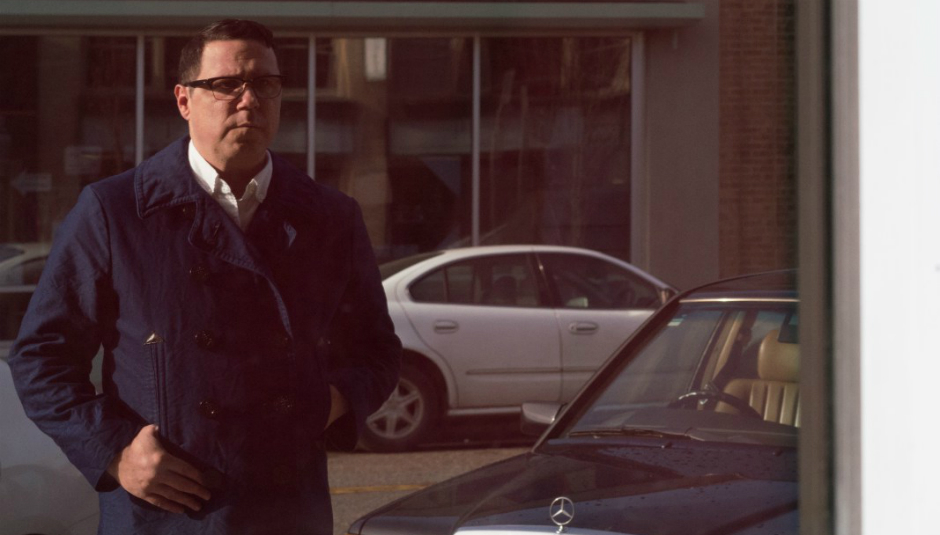Seattle stalwart Damien Jurado pulls out his iPhone and points it at me, with a stern, incredulous glare behind his black-rimmed glasses. Out of its tiny speakers rings a distorted, withered version of ‘God Only Knows’ by The Beach Boys. The song’s sonorous, widescape wonder reduced to a festering sound that would sooner end up on a Faust recording. Jurado keeps glaring without saying a thing, leaving it to the sound quality itself to prove his point. He then turns it off, like some kind of sonic torture device.
“This is how the world is now listening to music nowadays”, he scoffs. He then scrapes his throat and shrugs. “Pet Sounds is one of the greatest records of all time… it took over a year to make. Music is just noise now.”
Jurado’s bullshit detector is tuned to the max today. He’s in Amsterdam to do press for his new record The Horizon Just Laughed, but maybe for the first time in his career, the terms set for this assembly line of interviews are entirely his own. “Before you were doing interviews and press, you did it while you were still on touring the record – traditionally speaking. Now all the interviews are happening months before the album is even out. Journalists have the full album in their hands before the people do. I don’t like it, so I’m changing the entire thing. It doesn’t work, it doesn’t sell records. Sorry, record industry.”
Jurado now has his foot planted firmly in the door. Instead of giving us scribes the full album in advance, we received a sampler of three “random” songs. And in place of the usual summarized ‘making of’ backstory, all he issued was a third-party statement: “For the upcoming album, Damien is taking things at a much slower and focused pace than is common today. His desire is for the core of his audience to be the first to hear the complete physical album and he wanted them to do it together as a community. Creating a place of true togetherness, dialogue, and reflection, staying away from the quick comments, digital playlists and virtual streams.”
This is a fair gamble to take for Jurado because with two decades worth of music, he’s gained a steady enough cult following to at the very least break even. And according to him, the way he’s been releasing records “the past eight years” – the traditional album cycle via indie labels Sub Pop and Secretly Canadian – isn’t viable with his own ideals.
Jurado asks me my age (which is 35). “I’m forty-five, I’m ten years older than you. When an album was coming out, you couldn’t hear a record until midnight, the night before the record came out. The record store had a midnight sale, now you can stream a record even before it comes out officially. There’s all this talk about how good the vinyl industry is, but it’s not! It’s still a niche market. If you sell 2.5 million physical copies, it’s still very small compared to the number of people in the world listening to music. It is tiny!” When asked if the recording industry could be more flexible to accommodate the whims of artists, Jurado is brutally honest. “I think that the recording industry itself needs to be demolished. It needs to be destroyed. Completely. And I even mean that for independent labels as well. I don’t know how to elaborate, it just doesn’t work. The idea of giving shit away for free is bullshit. There you go. I don’t believe in free. I think ‘free’ is evil.”
Though I might be ten years Jurado’s junior, I’m just old enough to be empathetic to his wish to “cut out all the middlemen” between his music and his fans – as he himself puts it. I’m very reluctant to Google albums I listened to before this music writing thing took a hold of my life. In those days, owning record felt like a romantic relationship between you and the music: I was simply satisfied extracting a record’s meaning from within. Any intermediate from a publisher’s press release or article would taint that thoroughly magical bond. Let’s say if I were to look up info online on, for instance, PJ Harvey and John Parish’s Dance Hall At Louse Point, would my personal relationship with that music be severed once all this new information comes to light? For now, ignorance is bliss: my own version of that record is still more vital to me than ‘the world’s’, whatever that might entail.
Jurado too is a big advocate of building your own relationship with a record. The listener’s own narrative takes precedence over a neatly-packaged story that’s bound to be regurgitated over and over. “It’s like saying: I’m gonna buy this car, but have you driven it? No, but I’ve seen it. I read all about it. But you haven’t actually physically been in it and drove it yourself. That’s exactly what the fuck we’re doing right now.”
This is my third interview with Jurado, and for some reason, contrived press cycles haven’t eroded my sense of wonder and fascination for his music. Since the very moment I found a promotional CD of Maraqopa on my doorstep, his output all the way up to The Horizon has been stellar. His albums are – as Neil Young recently put in a similarly anti-streaming diatribe – like “universes of sound” that invite full immersion and exploration. Speaking of Young: one of my favourite Jurado moments is during our first encounter, when he spoke with infectious glee about Trans, as well as another polarizing record, Lulu by Lou Reed and Metallica.
When it’s all said and done, Jurado’s body of work might be considered similarly erratic as the aforementioned. Especially his early output on Sub Pop, which veered from the hazy, stream-of-consciousness bedroom folk of Ghost Of David to the overwrought indie rock of I Break Chairs (the latter was an attempt to dovetail with the success of Pacific Northwest peers like Death Cab For Cutie and Modest Mouse). His first few records on Secretly Canadian, though very solid, sounded like an artist mired in ambivalence, shrugging his shoulders, going through the motions. Nevertheless, he remained a man who understood he could pen a good tune at any moment, yet frantically kept bristling at the tortured songwriter-archetype.
Even though it must have felt like a straitjacket for Jurado during his first few albums on Secretly Canadian, down the line, that sense of discomfort would become the very reason listeners gravitate towards him. On stage as well, he is constantly changing between band-oriented shows to solo performances. Eventually, he chose to view his music as something that exists entirely outside his person, which in turn allowed him to become increasingly fearless in both his recording output and his live performances. “I’m very different from my art,” he remarks. “It’s like being asked whether you’re defined by your accounting job, or defined by driving a train. I am not my job. Music is something I do, it’s part of me, yeah. It doesn’t matter. What matters is that you’re affected by it. Did you enjoy it? That’s all that matters. Even if you hated it, that’s all that matters to me. But I’m not going to be defined by what I do.”
The seed for this soul search was planted when Jurado shared an apartment on Waters Avenue, Seattle, with Dave Bazan and Jeremy Enigk, who would make their marks as the creative forces of Pedro The Lion and Sunny Day Real Estate, respectively. Unlike his fellow residents, Jurado had no initial ambition in music; he wanted to become a painter. The attic where he stored his work was humid and hot, so the paint would never dry. So by osmosis, Jurado picked up a guitar started playing Minor Threat-inspired punk rock.
Though his music mellowed out from a sonic standpoint over the years, his distrust of established power structures certainly has not. “Look, here’s the thing, man”, Jurado sounds off. “The people who I looked up to growing up owned labels like Dischord, K Records and Kill Rock Stars. that was punk, music for the people. By the people. There weren’t any rules. Then suddenly, someone comes in that says: You gotta play this place to appeal to this market.”
About a year ago, Jurado decided to self-manage his touring schedule by playing in places across America where he’s never been. His goal is to visit at least one show in each of the fifty states, only not in the usual venues, but places within the periphery. “It’s about connecting with an audience who would otherwise drive six hours to see you play because your tour manager is not going to book you in their town. It was good. It’s reality. It’s what I grew up with. It’s the opposite of what you see on the Internet.”
Though 2008’s Caught In The Trees became Jurado’s most confessional and candid album at the time, the record didn’t exactly evaporate the stigma of troubled troubadour he (now not so) secretly loathes. Lighter on his feet from several years of suppressed emotions, Jurado ushered in the most critically-acclaimed phase of his career with 2010’s Saint Bartlett, marked by his singular symbiosis with producer, musician and songwriter Richard Swift. Saint Bartlett and the Maraqopa-trifecta veered Jurado up into that rare echelon of songwriters who could exhume unblemished truths through the fogs of fantasy and fiction.
The heart just sinks having to write about Jurado and Swift’s extraordinary work, in hindsight of the latter’s recent tragic passing. Seeing them gleefully air-drum to the dust bowl trot of ‘Silver Donna’ and goof around in Swift’s home studio, it’s immediately clear their bond was so much more profound than just the music it conceived. Both artists come from Mexican roots, both experienced their share of displacement, tragedy and alienation. From a creative standpoint, Swift seemed stationed as that vital cog in the machine that revved up indie rock heavyweights like The Shins, Foxygen, and The Black Keys, and in the process, his brilliant solo work remains somewhat unsung. Jurado lost his love for making records completely, as he was running out of fresh ideas to evoke with just voice and guitar. They needed each other.
Within the mirage-like, utopian settlement of Maraqopa, the outgoing Swift could manifest the more timid Jurado’s many ideas into sound; his ability to make the nostalgic sound futuristic – and vice versa – aligned perfectly with Jurado’s long-harnessed influences, elements he could never imbue into his own work by himself; the sectarian folk of The New Christy Minstrels, easy listening pioneer Ray Conniff, Richard Buckminster Fuller’s visionary work, Jim Sullivan’s resplendent soft rock masterpiece UFO, just to name a few. The creative chemistry between the two even sprawled over into cover album Other People’s Songs (including a brilliant spin on Kraftwerk’s ‘Radioactivity’) which will sadly remain stationed at a Volume One. But, to speak volumes of my own: their five-album stretch should cement Jurado-Swift as one of the greatest artist-producer tandems in pop history. It was, in short, really fucking rad.
With Swift’s abject fate now revealed to the public – a long, spiralling battle with alcohol abuse – you can’t help but wonder how that slow descent correlates with the self-produced The Horizon Just Laughed. Sonically, Jurado still embraces resplendency and warmth in his recordings, but the world he inhabits here feels tangible and real. For four albums, Swift and Jurado stretched their imagination to almost preposterous heights, peaking like the divine majesty of Mt. Rainier on double-album epic Visions Of Us On The Land. Unfortunately, it didn’t keep Jurado from succumbing to his darker thoughts. Sadly, only one of them was able to make it back from Maraqopa’s Zionistic paradise to this mortal coil.
On ‘Florence-Jean’, Jurado sings: “The future is a drag / I have to get back to my planet / I hate to let you down / Before the sun goes out / Never think I took you for granted”
‘Florence-Jean’ refers to Florence-Jean Castleberry, a fictional character in the TV series Alice, which in turn was based on the Martin Scorsese-film Alice Doesn’t Live Here Anymore. Jurado tells me he has been watching the TV show on old VHS tapes, and upon closer research, the film’s plot and characters are referenced numerous times on The Horizon Just Laughed. Sonically, ‘Florence-Jean’ is a far cry from the reverb-drenched, disembodied dreamscapes of Maraqopa. The song feels tangible, beguiling, immediate… it’s even got a strut in its step reminiscent to a Wilson Pickett tune, which is definitely different territory for Jurado.
Jurado: “I think the space of this album is very much a comforting one. It’s more a reliance of what I’m relating to sonically right now. I did the psychedelic thing for quite a long time, and I moved on from that. I’m in a new phase now, though I’m not quite sure what kind of phase that is. It’s still very eclectic.”
The prophets and apostles on The Horizon Just Laughed aren’t silver-clad settlers bringing our protagonist eternal enlightenment, but existing figures orbiting Jurado’s earthbound existence. ‘Percy Faith’ is named after a renowned Canadian composer who was forced to focus on arranging music over playing it after he severely burned his hands. He also name drops Allan Sherman, a comedian who incidentally became a song parodist long before the world ever heard of ‘Weird Al’ Yankovic.
All of these people – like Jurado and his initial quest to become a painter – became successful with a new craft by a simple twist of fate. Unlike proxies of dream worlds, purgatories and abodes of saints, this here reality doesn’t trace one’s whims and desires. It’s quite the opposite to the reverie of “Free is all we are”; throughout The Horizon Just Laughed, Jurado ambles across this troubled earth with the gospel nobility of a man out of time, not giving into an often cold, callous milieu of digital phones, by-the-numbers capitalist machines and social-political disarray. “Let your cries be of joy / May it always and forever fill the void”, he wistfully sings on ‘Of Rainbows And Rainier’, in a flourish of horns and strings that briefly echoes Louis Armstrong’s classic ‘What a Wonderful World’.
Concurrently, the album is filled with lyrics that portray missed connections and failures to communicate. On ‘Percy Faith’ Jurado finds himself stranded in the airport, but not before delivering one of his wittiest, most self-referential lines ever to Joseph Ray Conniff – a deceased musician he feels more kinship with than the angsty alternative rock patrimony of Seattle he’s been associated with since the very start of his career: I am writing from Seattle / Where they now have put a trademark on the rain.
Four years ago, during a show in Amsterdam, Jurado joked in-between songs: “We only tell people it always rains in Seattle to keep Californians from visiting.” Oddly enough, four years later, he traded the state of Washington he once called purgatory for the sun-gleamed avenues of California. “The album title The Horizon Just Laughed was taken from my many years of touring, especially flying,” Jurado explained at the start of what was a somewhat rocky interview. “I used to do this thing where I look out the window on the plane and be very sad about leaving. The horizon looking back at me laughing, saying ‘Why are you so upset? I’ll be here when you get back. You’re not missing anything!’”
A steady horizon might seem like the futility of one’s effort to move forward, the position of the sun always tells otherwise. If his combative spirit today tells me one thing, Damien Jurado isn’t ready yet to give in.
“When the raindrops fell / I lost my voice / To the one I love / And then Alice came around again / Like she always does.”
Better keep a raincheck on that.
The Horizon Just Laughed is out now via Secretly Canadian. For more information on Damien Jurado, including forthcoming tour dates, please visit his official website.
Photo Credit: Lindsey Barnes






















